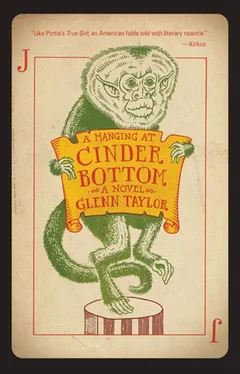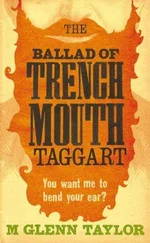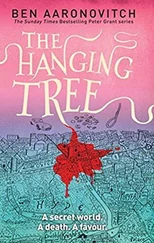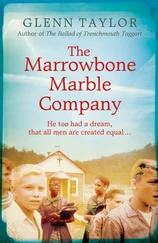Al nodded that he did.
“I met his little boy,” Trent said. He shook his head. “Half-Jew, half-Italian. I said they ought to have named him Sheeny Dago. It tickled Vic.”
Rutherford walked off in the direction of his undertaker’s room. He’d only just been trained a month before in the embalmer’s ways. He muttered to himself as he strode. Rutherford was a lazy little man, and there was much preparation for the slow work of body draining.
The small building at the bend was half jail, half mortuary. Men in Keystone were already acting up sufficient to be jailed, and in the mines there would always be rock fall and cage drop and white damp and black damp and choke damp and fire.
The hammers quieted and the crickets could be heard again. Trent said, “Vic Moon’s real name was Vincenzo Munetti.” The pipe waggled while he talked. “He had himself a woman down here too. He tell you about her?”
Al nodded that he hadn’t.
Trent let his pipe go out and watched Rutherford in the distance. He laughed and squinted one eye and used his thumb to sight his associate. “Isn’t as big as your fist is he?” He turned and squared up on Al Baach. “Tell me your last name again,” he said.
“Baach.”
“You say you’re a Dutchman?”
“I come from Germany.”
“You come from one of the big cities?”
“No.”
“What are you doing here?”
“My uncle has dry goods store in Tazewell.”
“What’s his name?”
“Isaac Baach.”
“I know of him.” This was not true. Trent worked his jaw muscle, and when he tried to imagine what Germany looked like, he saw nothing but castles and men in funny hats. “Your people live in the hills or on the water?”
“Hills.”
In the mud of the lane, they looked each other in the face.
Trent was twenty years older. He was three inches shorter and Al Baach outweighed him by thirty pounds. But Henry Trent had eyes only prizefighters possessed and hands like meat mallets too. After the war he was known for a time as the man who went sixty-eight bare-knuckled rounds with Professor Mike Donovan in Mississippi City, Mississippi. He’d lost on a foul.
He found intrigue in the young man. Al Baach wore a brand of confidence that Henry Trent liked to test. “Well Baach,” he said, “ole Vic Moon was abandoning his wife and child.” This too was not true. “Taking post as Keystone’s very first bartender. I had him all fixed up and ready to go.” Trent raised his left fist up between them and knocked his pipe hard against the knuckles. Black ash settled in the creases between his fingers. He held his fist there, clenched, and, with his right hand, slipped the pipe back into its pocket. He asked, “Do you know what I used to do about now if I smelled something wrong on a fella?”
“No,” Al Baach said.
“I puckered up and blew him a kiss.” Trent stepped to the side so that he wouldn’t dirty the young German, and then he demonstrated by pursing his lips tight and blowing hard on the pipe ash. It jumped right off his knuckles. He told how his blast of ash blinded a man in a half second, and how, before another ticked away, he’d have already sent a straight right home to its justifiable place — the smack-dab middle of the lying man’s face. “Put him to sleep every time,” Trent said. He smiled at the memories. “Give the devil his due.”
He told Al Baach he didn’t smell a thing wrong on him. There was something he quite liked in the young man. “And if you want to know my mind, you’ll make a damn sight more money here than you ever will in Tazewell.” He considered the offer he was about to make. “If you think you can do it, I’ll make you bartender at the saloon. I’ll pay you a better wage than your uncle, I’d imagine.”
It was then that Al Baach truly considered the strangeness of his day. Vic Moon had the good luck to ride the good horse, and the bad luck to be killed. Al had been downwind of a flatulent equine, but he was alive, and now he was looking at a prospect that, in his estimation, would not come along in a dry goods store.
Trent considered further. He said, “I’ll wire that money to the Munettis in Baltimore, pay out of my own pocket to embalm ole Vic and put him in a sod-box too.” He looked up at the clouds coming purple-black from the west and started toward the frame building. He waved Al to follow. “Hell,” he said, “You know what else?” He scraped his boots on the threshold and stepped in the empty doorframe. Al followed suit. “Rutherford can tote Vic up to White Sulphur and have him on the B&O mail train by sundown tomorrow.”
“The little man will do this?”
Trent nodded. “He’s got a rig for pulling coffins.”
Inside, there were two men at the back. One sanded the floorboards on his knees. The other stood on a wobbly split-pole ladder and looked up through the empty rafters.
“Go get supper,” Trent said, and the men stood and walked out between two wall studs.
In the center of the room stood the most beautiful table Al Baach had ever seen. It was a great big round table, thick as a headstone at the edges, and it sat atop cast-iron legs. It carried only a stack of fine paper, and next to the paper, a silver inkwell and dip pen. Trent said, “I’ll tell you the story of this table.” He rubbed its thick lacquer. He ran his finger along its circle rings. He asked, “Are you a drinking man?”
He poured from a hammered flask given to him by his company captain after the war. There were no chairs about, so they stood, each man lifting his glass with considerable frequency.
He told Al how he’d fashioned the table from a white oak tree with a breast circumference of twenty and one-half feet. The tree had been felled in 1867 by his logging crew out of Pumpkintown, South Carolina. “I was high-climber,” Trent said. He said he bucked the logs himself and drove a length down the Saluda River to the mill, where he won, on a bet, the thick stump cross-section that now stood before them. He said he’d ridden the log knots up, whistling all the way.
Al listened and drank.
Trent could tell a story, and his whiskey flattered the palette of any sensible man or woman.
He told of how it wasn’t long before he bought that timber outfit and it was his name branded on tens of thousands of floating butt cuts. “Everybody called them hot cuts on account of my initials.” Oliver was his middle name.
He told of 1875, when he sold the company for four hundred times what he’d paid, and, like so many speculators before him, bought up considerable land tracts in southern West Virginia. Hill land he stripped of timber. Creek bed he built upon. He settled in Keystone and partnered with two local men, the Beavers brothers. Together, they opened a sawmill and a mine.
Dynamited railbeds and opened coal seams had men primed for a rush on black gold. Clapboard and brick raced upward, and there were, at that time, too many thirsty workers and too few barstools. But Trent said he would keep pace, building two-story tenements and boardinghouses and squared-off spaces meant to be saloons. He motioned all around with his hands, gesturing at the air beyond the open wall studs. “Virginia ought not to have given up McDowell County,” he told Al Baach, “for this is where fortunes will sprout.”
And so it was that on that September day, Al Baach gave over the one hundred and twenty-three dollars to a powerful rich man who vowed he’d wire it to Vic Moon’s widow and boy.
Trent picked up the pen and dipped it. He wrote the contract in a fashion that was nearly indecipherable, but his numericals were in order. They were readable and substantial, the kind of numbers that allowed ample room for a man like Al to save in a hurry.
Читать дальше
Конец ознакомительного отрывка
Купить книгу












